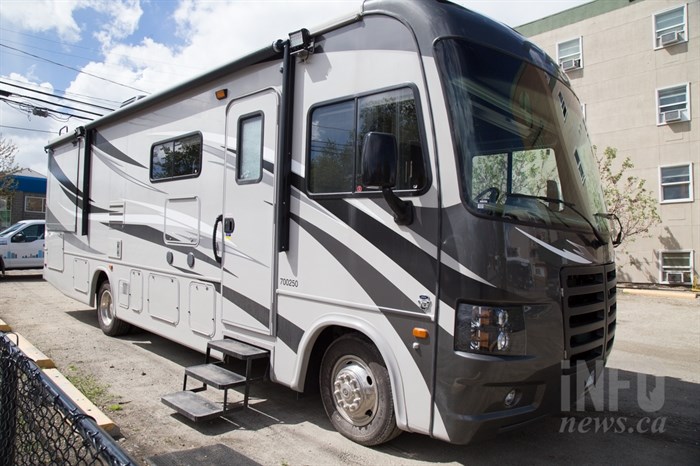
The Kamloops mobile overdose prevention unit, which is similar to the RV used in Kelowna, is pictured in this file photo.
Image Credit: FILE PHOTO
July 22, 2019 - 5:00 PM
KELOWNA - Some Rutland residents have posted concerns to Facebook about the recreational vehicle parked near a mall on Highway 33 where addicts come to shoot up drugs. Of particular concern was the belief that some appeared to be driving up to the RV, ingesting drugs and then driving away.
The RV in question is part of the Interior Health Authority's mobile supervised consumptions services.
The mobile unit has been moving between the Rutland location on Park Road, just off Highway 33, next to the Community Dialysis Centre and Leon Avenue behind Outreach Urban Health for more than two years, preventing dozens of overdose deaths and directing hundreds of users towards recovery resources. The RV spends evenings in Rutland and days in downtown Kelowna.
According to Interior Health’s director of substance use Corinne Dolman, it’s unlikely drug users are driving away stoned.
“If staff are aware that someone is consuming substances and getting into a motor vehicle, they do have to an obligation to notify the police,” Dolman told iNFOnews.ca. “And, they do notify anyone coming in from a vehicle that it’s their (staff’s) obligation to notify the police.”
Most of the people using the RV don’t drive there, she said, and those who do, are usually coming for "harm reduction supplies." People injecting at the site usually don’t travel far to do so.
"There is definitely a population of marginalized homeless people in Rutland that do not want to access services in the downtown core,” she said. “There is a population existing in Rutland and that is one of the reasons that the mobile (site) was chosen. The population of folks already existed, prior to the services.”
Dolman said since it started operating in April 2017, there have been 13,938 visits (up to January 2019) by mostly homeless people who either want a safe place to inject drugs or to pick up needles and Naloxone kits.
While she didn’t have statistics broken down by location, Dolman said the usage in Rutland is fairly low.
Social media posts are also blaming the RV for an abundance of needles littering the neighbourhood, some saying this wasn’t a problem before the RV started operating.
Part of the harm reduction program is for some people to take clean needles home to use there and, if they are given a few, they are also given a safe disposal container. Staff also walk around the neighbourhood, picking up garbage and any discarded needles, Dolman said.
Other social media critics say such services just fuel the addictions and the only way to cure addicts is to stop "enabling" them, cut off the supply or ship addicts to forced detox sites, often specifying that be out of town.
Dolman spoke to iNFOnews.ca earlier about how forced withdrawal from opioids not only does not work but can be life-threatening. Between the two locations, there have been 639 cases where nurses helped treat injuries or directed people to medical services, 61 overdose deaths were prevented and there have been 735 referrals.
“We are very careful with our data analysis on referrals,” Dolman said. “This doesn’t mean that you just suggest that somebody give them a phone number. It’s actually that there’s been a connection made, perhaps to withdrawal management or to a substance use clinician.”
She’s not able to track what happens with those referrals but studies show this is often the first step people take to turn their lives around.
Despite the success of the program, there are no plans for it to expand.
“It really is an indication of a need for increased services,” Dolman said. “Perhaps the mobile supervised consumption site should be open longer. Having a day shelter or a place where people can consume substances, access washrooms, those kinds of things, would actually reduce the problem in Rutland.”
There have been some preliminary discussions about setting up a more permanent site somewhere in Kelowna, but none about expanding the mobile service.
“One of the problems in Rutland is that there are so few resources during the day for people that are homeless and marginalized,” she said. “Sometimes there’s not even places for people to go to the washroom. And, there are no shelters in Rutland so people are having to find places outdoors to sleep at night.”
Two supportive housing projects for the homeless are planned for Rutland.
A petition drive against a project on McCurdy Road pressured Kelowna City Council and B.C. Housing to make it a dry facility where tenants commit to not using illegal substances.
A similar project designated for McIntosh Road is still planned as a no barrier facility where residents can consume drugs and alcohol in their own rooms and there will be a supervised injection site to reduce the chances of overdose deaths.
That project still has to go to city council for a development permit, maybe in August.
To contact a reporter for this story, email Rob Munro or call 250-808-0143 or email the editor. You can also submit photos, videos or news tips to the newsroom and be entered to win a monthly prize draw.
We welcome your comments and opinions on our stories but play nice. We won't censor or delete comments unless they contain off-topic statements or links, unnecessary vulgarity, false facts, spam or obviously fake profiles. If you have any concerns about what you see in comments, email the editor in the link above.
News from © iNFOnews, 2019